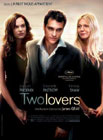
|
Two Lovers review
:. Director: James Gray
:. Starring: Joaquin Phoenix, Gwyneth Paltrow
:. Script: James Gray Ric Menello
:. Running Time: 1:40
:. Year: 2008
:. Country: USA
:. Official Site: Two Lovers
|
Barely a year after We own the night was released, the director who used to make us wait between films (seven years between The Yards and We own the night) is back on the big screen with Two Lovers, his opportunity to abandon the thrillers emblematic of his work (Little Odessa, The Yards, We Own the Night) and explore the inexhaustible theme of love. More of a turning point than a success but not a real change of direction in his filmography, Two Loversstill possesses the sense of tragedy that clouds the work of director James Gray.
From the first shots it's obvious that Two Lovers differs from the usual American romantic comedies that treat the state of love as absurd. No laughs here, though tears are promised and the tone is set from the first sublime shot. Filmed from behind under an ashen sky, Leonard (Joaquin Phoenix) moves in slow motion on a dock before jumping into the water. A gull moves through the frame and an industrial deafening roar fills the space. From the suicide attempt at the opening of the film, James Gray paints a bruised character whose scars are unlikely to heal.
Leonard lives with his parents after breaking up with his fiancée. His parents push him to his new partner's daughter (Vinessa shaw), who sees him as his successor. When he meets his new neighbor Michelle(Gwyneth Paltrow), his heart begins to hesitate. Between the conquered brunette who promises him a tidy life and the blonde who only sees him as a faithful and devoted friend, Leonard will have to make choices that won't leave him unscathed.
Two Loversis a film for an audience that's already come a long way on the road to love. No happy endings with Gray; we know what the outcome will be. Gray doesn't play the mischievous director with a twist at the end. All situations are known: we know what he's going to write on Michelle's arm, we know what bad news she'll announce at their last meeting, we know what Leonard will do with the ring he didn't give her. Why do these scenes work? We've seen it a thousand times, and despite everything they go straight to the heart? Behind the classicism of the staging and the story itself, the film invokes the intimate experience of the audience and returns them to their own solitude, their own suffering and their own frustrations. He speaks directly to the heart, to those who have loved, to those who have faced the worst disappointments, who have hit rock bottom and planned to give it all up out of love and have capitulated to the weight of destiny and fate. If we know the end of Gray's film, it is precisely because his film is located on the side of the tragedy. That of a character who fails to escape his destiny (here, taking over the family business and having a family with a young and beautiful promise chosen for him) and who fails to embrace ideal love after having touched it.
Despite some dramatic shortcuts, Gray expedites the process of seduction to get to the essence of his message: what interests him here is how impossible it is for his characters to escape destiny - Two Loversreveals itself to be an excellent and enjoyable surprise that finally does away with the aesthetic and style that helped build Gray's oeuvre.
Moland Fengkov
Moland Fengkov
Translated into English by Anji Milanovic

|
MAILING LIST
Get our reviews by e-mail
We'll never Spam you
|
|
|


